Search
Showing 10 of 1954 results for NARSC 2016 conference registration fees student pre advance late July 2016
-
Massey study abroad programme a big hit
Greg Huff, Manager of Student Mobility, said 38 students from the United States (US) have signed up for this year’s National Expedition and Internship, up from the first year tally of seven.
Education New Zealand provided financial support through the International Education Growth Fund to help kick-start the programme.
The expedition and internship, which can be selected separately or together during June and July, hosts students for two weeks’ travel through New Zealand followed by a four week internship in Hawke’s Bay while earning university credits. Massey's six week study abroad programme takes place during the US summer holidays and is equivalent to earning half a semester's worth of credits that can be transferred back to their home university.
This customised study abroad experience provides opportunities for students studying agriculture, agribusiness, environmental science and wildlife management to gain hands-on professional experience relevant to their degree.
The current programme has proven to be so successful Massey will next year offer a programme targeting students studying journalism, public relations, advertising, media studies, marketing and communications. Details are still being developed but it is likely to be based in Wellington.
Greg is promoting the programmes at NAFSA (National Association of International Educators – previously foreign student advisers).
While Massey is focusing its recruiting efforts on the United States, students from any country are welcome to attend. Some international students studying in the US have chosen to come on this programme.
Massey is also looking to start a third programme in 2017.
“We’re looking at programmes that are complementary so they do not cannibalise each other. We are very pleased with the interest shown by students.”
-
ChristchurchNZ to launch this year
Christchurch Educated is one of the agencies that will merge into ChristchurchNZ.
Bree Loverich, Programme Manager for Christchurch Educated, said the new single agency will provide better opportunities for the international education industry to create a globally connected region, providing enhanced student opportunities and outcomes with enduring benefits for the community.
“Over the next 15 years, Canterbury is expecting big changes to the world of work, losing more than 70,000 workers as baby boomers move into retirement, while technological disruption will massively impact our economy.
“ChristchurchNZ is aware that the city is going to need a great deal of smart and skilled people to continue to drive the economic development already underway. One of the best ways to do this is via a joined-up approach to maximise opportunities,” said Bree.
ChristchurchNZ brings together Christchurch & Canterbury Tourism (CCT), the Convention Bureau, Canterbury Development Corporation (CDC), Christchurch Educated, and the Christchurch City Council’s Major Events team. Together, their purpose is to ‘support prosperity, opportunity and a great quality of life in Christchurch and Canterbury’.
This will be achieved by:
- developing a positive city profile and promoting the city to residents, national and international audiences
- attracting visitors, migrants, students, new business and investment through integrated marketing, major events and conferences
- ensuring the business environment supports successful and sustainable enterprise and encourages creativity and innovation.
Bree said one example of collaboration already underway is the Canterbury Job Ready Programme, designed and delivered by economic development, regional Chambers of Commerce, NZ Trade and Enterprise and the regional international education team.
In collaboration with ChristchurchNZ Major Events, next year’s International Student Welcome will run as the opening event of the city’s Lantern Festival.
“ChristchurchNZ will continue to look for synergies to work smarter as a region to result in greater attraction, but also retention of international students who benefit from being here and in turn benefit the region,” said Bree.
ChristchurchNZ will be located in the new BNZ Centre, Cashel Mall once the premises are completed in July or August.
Until the merger process is completed later in the year, many of these organisations will continue to deliver to their existing business plans. All permanent employees will then move to ChristchurchNZ, so all staff relationships and contacts will continue as normal.
-
Service strategy for international Chinese students
With growing numbers of Chinese students studying abroad and at an earlier age, students and their parents are now looking for a wider range of customised services of support both during and after the study abroad experience.
Agents are now expected to advise students graduating from an overseas high school on choosing a major at university, as well as how to find a job after graduation. These types of services are called ‘after-study-abroad services’ in China.
Adele Bryant, ENZ Regional Director – China and North Asia, welcomes JJL’s initiative.
“It responds to student demand for more personalised services and provides an opportunity for agents to add value to the student experience, as well as increase revenue from individual students.”
“In addition, expectations for educational providers to provide similar services will rise.”
As part of its strategy, JJL opened its first overseas branch office in Vancouver, Canada in July. JJL expects to open branches in other popular destinations for Chinese students in the future.
-
New travel rules and levy for New Zealand
Find out what the new International Visitor Conservation and Tourism Levy means for international students coming to New Zealand.
International Visitor Conservation and Tourism Levy
On 1 July 2019, the International Visitor Conservation and Tourism Levy (IVL) was introduced. This new levy costs NZ$35 per person and is paid when you apply for a visa or request a New Zealand Electronic Travel Authority (NZeTA).
How do you apply for an IVL?
If someone is applying for a visa, including a student visa, the levy will be automatically added to the application cost. Even though the levy is for conservation and tourism, it does apply to most international students too.
What if a person doesn’t need a visa?
If an international student is coming to New Zealand before 1 October and is from a visa-waiver country or is not staying long enough to need a visa, they do not need to pay for an IVL.
What’s changing on 1 October 2019?
From 1 October 2019, New Zealand is introducing a new travel requirement that may affect international students coming to New Zealand.
The NZeTA (New Zealand Electronic Travel Authority) needs to be issued before traveling to New Zealand. It can take up to 72 hours to be assessed, so anyone coming to New Zealand should request their NZeTA in plenty of time. Requests can be made via the official app or Immigration New Zealand’s website. There is a small fee.
- $9 for requests made through the NZeTA app
- $12 for requests made through the Immigration NZ website.
When a person requests an NZeTA, they will automatically be charged the International Visitor Conservation and Tourism Levy (IVL).
Total payment will be:
- $44 for requests made through the NZeTA app
- $47 for requests made through the Immigration NZ website.
Who must hold an NZeTA before travelling to New Zealand?
- People visiting or in transit from a visa-waiver country — that is, a country whose passport holders do not need to get a visa before they arrive in New Zealand.
- People travelling on a passport from a transit visa-waiver country, and who will be in transit through Auckland International Airport’s transit lounge on the way to another country.
- Permanent residents of Australia.
Who doesn’t pay the International Visitor Conservation and Tourism levy?
Most visitors to New Zealand pay the IVL. If a person is required to pay the IVL, the amount will be automatically added to the cost of their visa application or NZeTA request.
You do not pay for an IVL if you travel to New Zealand on:
- an Australian or New Zealand passport
- a passport from many Pacific Island nations
- you are a transit passenger arriving at and leaving from Auckland International Airport
- you have a New Zealand resident visa
- you hold a Business Visitor Visa or APEC business travel card.
What does this mean for international students?
People who are planning to come to New Zealand to complete a short course, such as an English language course, will need to request an NZeTA before they travel if they are coming from a visa-waiver country. They will pay the IVL when requesting the NZeTA.
International students who need a visa to study will not need to get an NZeTA, but they will pay the additional NZD$35 for an IVL when they apply for a visa.
What about current international students?
International students who have already applied for and have a valid visa will not have to pay the IVL until they renew their visas.
How long is the IVL and NZeTA valid for?
The NZeTA is valid for two years. The IVL is charged every time a person requests a new visa or NZetA.
-
Viet Nam kickstarts 2021 with series of offline student events
This January, ENZ’s team in Viet Nam sought out a number of opportunities for New Zealand providers to appear at in-person or hybrid events.
ENZ has also participated in a series of multi-destination education fairs organised by SiPM and ATS at three top high schools in Ha Noi, university admission day in the northern Vĩnh Phúc province, and a New Zealand University Fair co-hosted by ENZ at Nguyen Sieu school (a long-standing partner for several New Zealand institutions).
As travel restrictions are still in place around the world, these fairs are not necessarily aimed towards immediate student attraction. ENZ is attending these events as part of the marketing and brand protection work that comes under the third workstream of the Recovery Plan for International Education.
Many attendees expressed a wish to study in New Zealand, especially after learning about our successful COVID-19 response.
“Students and parents are still concerned about safety and political stability, so New Zealand is currently being viewed as an ideal destination for study when border restrictions are lifted,” ENZ Market Manager – Viet Nam, Van Banh, says.
Viet Nam’s economy was heavily impacted by COVID, but data still shows that Vietnam recorded net positive GDP growth in 2020, which is considered an impressive achievement in the present global context. As a result, other study destinations have also kept their promotional activities warm in this market.
-
An update from the ENZ Global Citizens team
Introducing our Global Citizens Manager, Carla Rey Vasquez
Carla joined ENZ in the new role of Global Citizens Manager, based in Wellington, in April. As part of her role with ENZ, she is leading the co-creation and implementation of the Global Citizenship strategy as a key enabler for international education.
Prior to joining ENZ, Carla was actively engaged in cross-sector collaboration in her role at AFS, including educational institutions, experts, funders, peak bodies, and student groups – and had a focus on embedding and improving student experience and global citizenship outcomes across the AFS network for 12,000 students in over 60 organizations worldwide.
ENZ's Global Citizenship team includes Senior Global Citizens Advisor Anna Dekker in a refocused role of Scholarships and Global Citizenship, and Global Citizens Advisor Tereska Thornton, who has a wide range experience across ENZ in various roles, including Acting International Market Manager for Korea and Japan.
Over the past five months, the team have made some great strides in establishing the global citizens strategy for NZ, and some highlights from their work includes:
Global Citizenship korero
Two huis have already been held this year with educators, researchers, practitioners, change-makers and other supporters working on initiatives that promote global citizenship, and the related areas of global competence, intercultural learning, and intercultural competence.
The goals of the workshops were to:
- Map out the key players and activities within the Global Citizenship education field in Aotearoa New Zealand
- Build a comprehensive understanding of the way in which organisations discuss and measure Global Citizenship, and values and frameworks unique to Aotearoa New Zealand.
We are looking forward to our third session on 21 September. This session will be virtual due to current Alert Level restrictions but we hope to have another in-person hui before the end of the year.
Please email Carla (carla.reyvasquez@enz.govt.nz) if you wish to be involved.
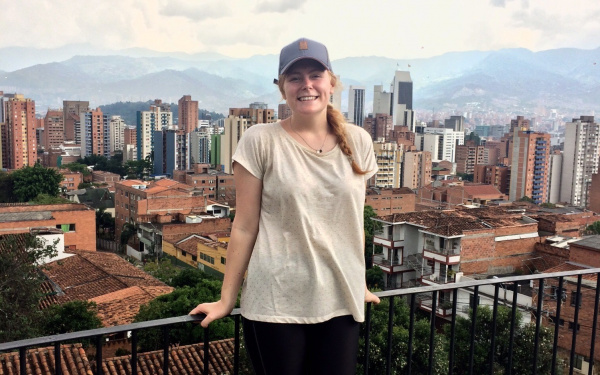
Online connector event for Prime Minister’s Scholarship alumni
We are planning our first ever online connector event for Prime Minister’s Scholarship alumni in November 2021.
Building on the momentum of the recent Prime Minister’s Scholarship impact survey, the event will be run by alumni, for alumni and will focus on fostering connections within the alumni community as a basis for further activity. More details to be announced in the next E-News update so watch this space.
Prime Minister’s Scholarship Programme
The team has made the best use of the COVID-19 travel restrictions and lockdowns to undertake a Prime Minister’s scholarships improvement programme to increase access to the scholarship and streamline processes, ready for when travel is possible.
Festival for the Future
We attended the Festival for the Future from 31 July-2 August and were overwhelmed by the number of participants who were willing to take part in our survey on Global Citizenship. The analysis of responses is going a long way to helping ENZ commence on developing a framework and set of definitions on global citizenship.
We are currently working with Inspiring Stories to plan ENZ’s involvement in Festival for the Future 2022, so keep an eye out for further information.
Global citizenship is a key focus for ENZ, as ‘Global Citizens’ is one of three goals in The New Zealand Government’s International Education Strategy 2018 – 2030 (NZIES). Ultimately, we are working towards a future where:
- All students gain the knowledge, skills and capabilities they need to live, work and learn globally
- International education provides stronger global connections, research links and partnerships for New Zealand
- New Zealanders understand and embrace the benefits of international education
We will make sure to keep you updated of the work in this space.
-
New Zealand progressively reopens borders for international students in 2022 with new start in 2023
Note: The information in this story was correct at the time of publication, however, some steps in New Zealand's border reopening plan have now been brought forward. Click here to check the current border reopening steps.
Education New Zealand Manapou ki te Ao (ENZ) welcomes the Government’s announcement to reopen New Zealand’s borders. This is a positive step for international education.
The announcement outlined a five-step process for reopening borders from 28 February 2022, initially for New Zealanders to return from Australia and then from the rest of the world.
The Government also announced a fourth border class exception for up to 5,000 international students to enter New Zealand for study from mid-2022, in addition to the earlier cohorts approved in 2020 and 2021.
From October 2022 normal visa processing will resume, enabling international students to enroll for study in New Zealand in 2023.
ENZ Chief Executive Grant McPherson says today’s announcement is an important step towards rebuilding a strengthened and sustainable international education sector. “The border reopening steps outlined today enable the international education sector to progressively open through 2022 for the existing cohorts, with a new much larger cohort able to enter New Zealand for study before semester two. More details of the new student cohort will be determined by the Ministers of Education and Immigration and advised in due course.
“There's also an opportunity for students from Visa Waiver countries such as Japan and South Korea to enter New Zealand from July for short visits of up to three months.
“The Government has demonstrated their commitment to international students and educational institutions in 2023, with normal visa processing resuming in October 2022. This means international students can plan towards being in New Zealand for courses starting in 2023.”
Mr. McPherson said education providers could now plan with greater certainty for the year ahead.
“It has been an incredibly challenging period for New Zealand education providers, international students, and those who support them. The sector has shown considerable patience as the borders were carefully managed to minimize the threat posed by COVID-19. Today’s announcement is an opportunity to rebuild and reshape the sector to meet the challenges ahead.”
Mr. McPherson said the innovation and diversification into online learning and delivery of courses offshore, including pathway programmes over the last few years, would remain a feature in the industry as it moved forward. Today's announcement also prepares the way for New Zealand students to resume international studies abroad in the future.
“All New Zealand education providers know the value of building international partnerships, and developing new ways of meeting student needs. These are important building blocks for future resilience and quality education outcomes.
“In addition, from 14 March 2022 students entering New Zealand through the border exception cohorts will have the opportunity to self-isolate, rather than going through Managed Isolation and Quarantine facilities - subject to complying with all the required health and border requirements.”
Mr McPherson stressed the importance of seeking advice before moving forward with applications for enrolment. Students who have questions about this border class exception should contact their agent or preferred education provider in the first instance.
Students can also visit NauMai NZ, which provides useful information for international students in New Zealand or preparing to travel to New Zealand.
He rā ki tua – Better days are coming!
-
International students welcomed at Waitangi
One such welcome to acknowledge and celebrate students from around the world took place on the Waitangi Treaty Grounds on 10 August 2022.
Study Northland organised a wonderful half day programme to welcome 70 international students currently studying at Whangarei Girls High, NorthTec, Kerikeri High School and Springbank School. This included a pōwhiri, cultural performance, and a ceremony in which each student was presented with Tū Ngātahi pins and welcome certificates. They then had the opportunity to explore the history and relevance of the Treaty Grounds, and the morning ended with fish and chips in the sunshine.
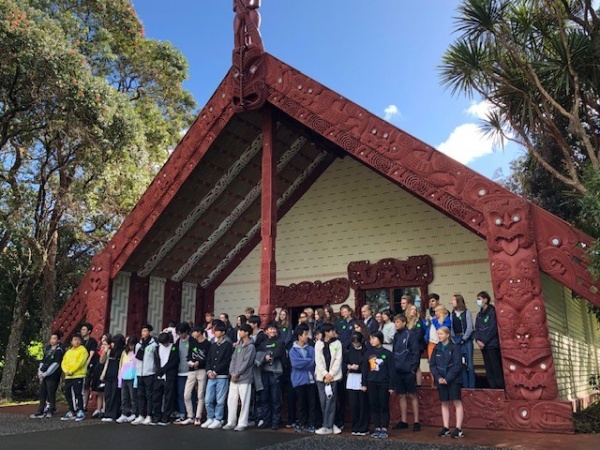
Students outside Te Wharenui at Waitangi
Tū Ngātahi is a te reo Māori phrase calling us to ‘stand together’. Education New Zealand Manapou ki te Ao developed this programme as a demonstration of welcome and support to international students, a celebration of the connection between cultures, and a recognition of the friendship and learning we share. The welcome at the Treaty Grounds was an ideal opportunity for the spirit and concept of Tū Ngātahi to be brought to life.
Ross Crossan (centre), ENZ’s Student Experience Manager, presented the students with Tū Ngātahi pins as part of the Waitangi welcome
Students were excited to be in New Zealand, some for the first time and some returning after heading back home during the pandemic.
Several of the recently arrived students at Whangarei Girls shared their first impressions with us. Fish and chips are certainly a hit, as is the chance to play badminton, volleyball, and other sports with friends. A few students mentioned the different school hours here. They also commented that just a little bit more time might be needed to get used to the weather!
Fish and chips were a highlight at Waitangi
Arisara Pungpho, from Thailand, is attending Springbank School. She has been coming to New Zealand for many years with her family. Arisara is here for six months, and says she most enjoys New Zealand’s environment, and its tranquillity and peacefulness.
“Most places in Thailand compared to New Zealand are very fast, very busy, and very lively,” Arisara says. “I also feel New Zealand is more inclusive of many cultures, which is not what I have experienced in other countries around the world.”
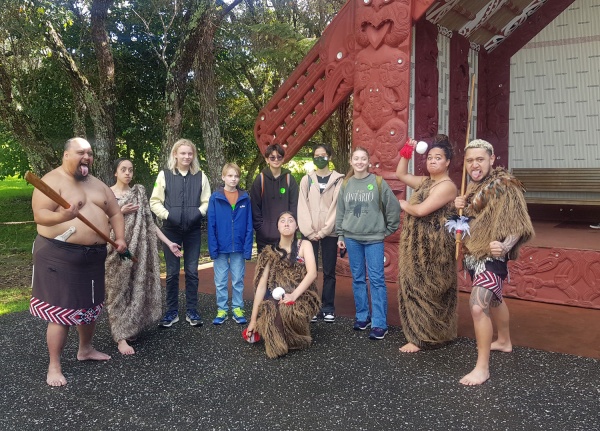
Springbank School students, including Arisara Pungpho (4th from left) and Elisabeth Ringel (3rd from left) enjoyed the cultural demonstration at Waitangi
Elisabeth Ringel particularly appreciated the warm welcome she received when she travelled here from Germany in July for a year.
“When I arrived in Auckland, I was surprised how friendly and welcoming everybody was, and how the brother of the Principal of Springbank School, with his family, drove me to my host family in Kerikeri – because my Auckland to Kerikeri flight was cancelled,” Elisabeth says.
With borders now open again, this is a significant moment for our international education sector, and we all look forward to welcoming more students to our institutions and communities over the coming months.
#TūNgātahi
Recent welcome events around the country
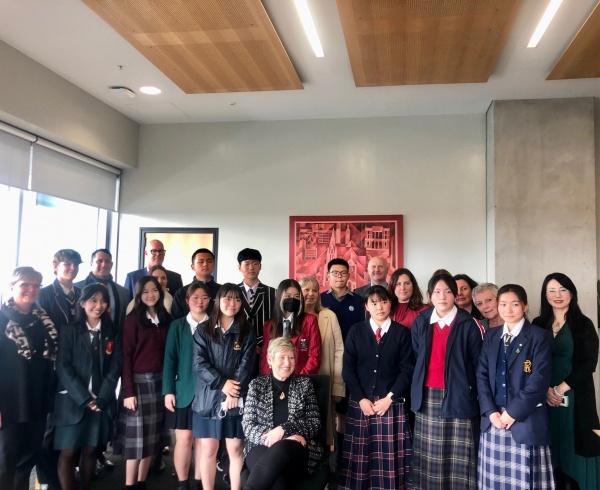
International students met with Christchurch Mayor Lianne Dalziel
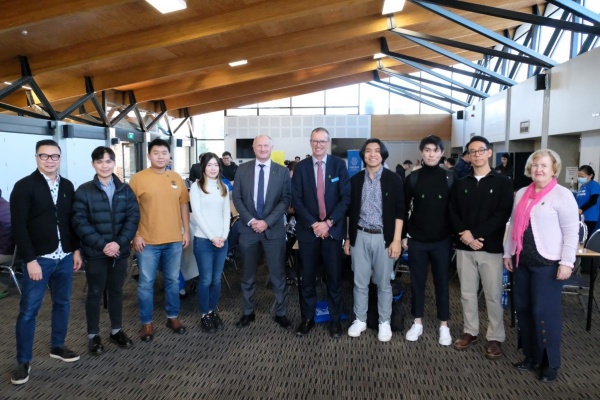
International students being welcomed to Lincoln University
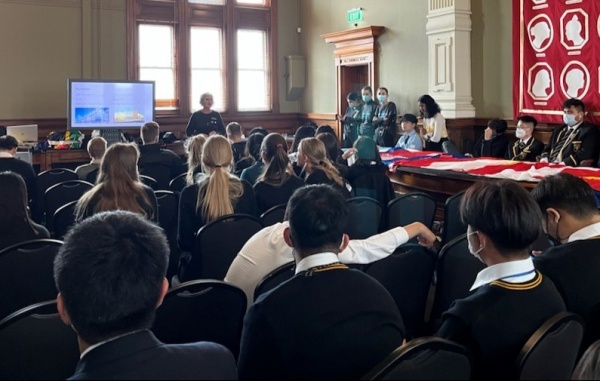
Wellington International Students' Association ran an event for over 140 international students from eight countries over the course of two days
-
New AgentLab platform launched to support education agents
Launched in early August, the new platform features a wide range of relevant information and updates to support education agents and consultants promoting study with Aotearoa New Zealand. This includes a calendar of agent-focused events and webinars, resources, and latest news and updates from across the Aotearoa New Zealand education landscape.
In 2022, Education New Zealand Manapou ki te Ao (ENZ) reviewed its agent engagement programme to ensure its offering for education agents is best placed to support the international education sector’s recovery.
ENZ commissioned Edified to research and evaluate its broad agent engagement programme as well as the ENZ Recognised Agency programme. Refreshing the AgentLab platform to offer agents a wider range of information about Aotearoa New Zealand education was among the recommendations of the Edified report.
ENZ’s Director – Sector Services, Laura Simpson, said the AgentLab platform’s refresh was guided by a need to better support all education agents, knowing the crucial role they play.
“We are developing the AgentLab platform with more tools and resources. We will continue to grow the platform to best serve all agents in their work to support students wanting to study with Aotearoa New Zealand. This helps us ensure that agents have access to accurate information, so they are best placed to drive international student recruitment and support the sector’s post-pandemic recovery.
“This is important work given our goal to grow onshore international student numbers. Rebuilding the sector to a thriving, resilient one is a major focus for Aotearoa New Zealand. We know that the relationship between education providers and agents is the primary one. So our job, set out clearly in Focus Area One of the International Education Strategy, is to make sure we support high-quality education agents in recruiting students to Aotearoa New Zealand and supporting the sector’s recovery,” Laura said.
The new AgentLab platform is hosted at the same address as the old site at agentlab.enz.govt.nz. It is easily accessed through the single sign-on, MaiENZ portal through which ENZ offers all its digital services to Aotearoa New Zealand’s international education sector. Existing AgentLab users will be able to seamlessly access the new site with their current MaiENZ logins.
The discontinuation of the ENZ Recognised Agencies (ENZRA) programme that was announced to the sector and education agents in July was also an outcome of the agent engagement review. All education agents – including former ENZRA agents – will be able to access the same level of information and resources via the AgentLab platform. The discontinuation of the ENZRA programme will not affect this.
-
New Zealand institutions strengthen ties with Latin American education agencies
In April, ENZ supported the Study in New Zealand Agent Seminars – an event series organised by Kiwi EdLink, a New Zealand-based organisation that represents education providers across the country.
New Zealand’s educations offerings for Latin American students were showcased to education agents at the seminars. From English language programmes for children, youth, and adults to short or long-term school studies in New Zealand.
The participating institutions from New Zealand were the Kiwi English Academy, Glendowie College and Onslow College.
ENZ teams in Santiago and São Paulo hosted networking events at the New Zealand Embassy in Chile and the Consulate in Brazil, inviting selected agents aligned with Kiwi EdLink’s strategic goals in the region.
In addition to facilitating these connections, the ENZ team also provided market insights and engaged in conversations about future steps to deepen engagement and opportunities in Latin America’s dynamic education landscape.
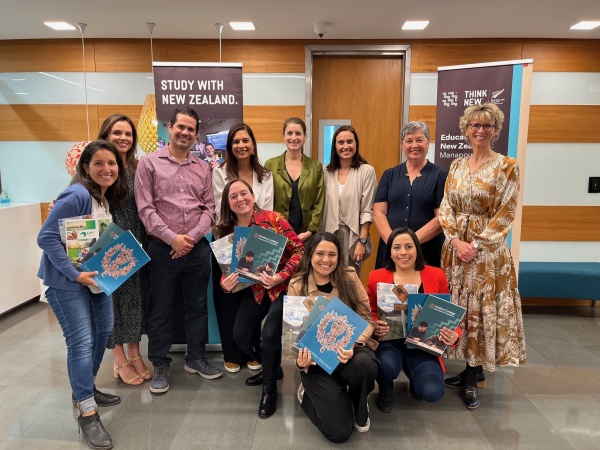
Attendees of the Study in New Zealand seminar in Santiago, Chile. This event was hosted at the New Zealand Embassy.
During the event in São Paulo, Director of Kiwi English Academy, Kathryn Herbert, said “This is a moment to reconnect with our Latin American partners so we can better understand how to offer relevant programs to Brazilian students.”
The feedback from sector attendees was positive. Director of International Students at Onslow College, Robynne Bloemstein, said that the institution is very excited to reengage with the Latin American market and welcome students from the region into its student body, which already includes 45 international students.
It was the first visit to Brazil for the Director of International Students at Glendowie College, Rebecca Johnstone. She said “We love Latin American students—we currently have 47 international students in total, including two Chilean students and a new Brazilian student starting in July. They all contribute greatly to the multicultural environment of our school.”
Check out the video report the ENZ team put together with the representatives of New Zealand schools at the São Paulo event.

